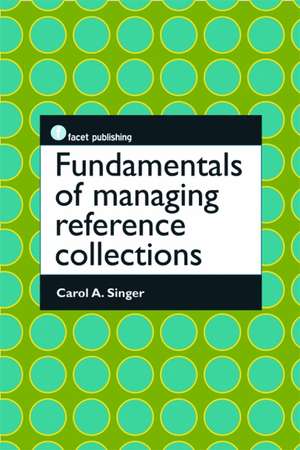Fundamentals of Managing Reference Collections
Autor Carol Singeren Limba Engleză Paperback – 23 iul 2012
Preț: 355.83 lei
Preț vechi: 589.69 lei
-40% Nou
Puncte Express: 534
Preț estimativ în valută:
68.10€ • 70.83$ • 56.22£
68.10€ • 70.83$ • 56.22£
Comandă specială
Livrare economică 24 martie-07 aprilie
Doresc să fiu notificat când acest titlu va fi disponibil:
Se trimite...
Preluare comenzi: 021 569.72.76
Specificații
ISBN-13: 9781856048316
ISBN-10: 1856048314
Pagini: 182
Dimensiuni: 152 x 229 x 11 mm
Greutate: 0.3 kg
Ediția:1
Editura: Facet Publishing
Colecția Facet Publishing
ISBN-10: 1856048314
Pagini: 182
Dimensiuni: 152 x 229 x 11 mm
Greutate: 0.3 kg
Ediția:1
Editura: Facet Publishing
Colecția Facet Publishing
Public țintă
Professional Practice & DevelopmentCuprins
1. Reference collection fundamentals Definitions Paper or electronic resources? Going mobile Defining boundaries 2. Reference collection development policies The parts of a collection development policy Purpose of the reference collection development policy Responsibility for collection development Purpose of the reference collection Target audience(s) Budgeting and funding Selection criteria Selection aids Preferred format Duplicates Preferred language(s) Circulation Treatment of specific resource groups Resource sharing Collection maintenance Weeding and reviewing the collection Policy revision 3. Staffing models for reference collection management Centralized staffing Decentralized staffing Other participants in reference collection management 4. Selecting reference materials Using reviews of books and online resources General selection criteria Selection criteria for online resources Aggregated databases of reference books Selection criteria for free internet resources Selection criteria for print monographs Selection criteria for print serials 5. Acquisitions, budgets, and licenses Acquisitions Budgets Licenses 6. Collection maintenance Maintenance of new electronic resources Maintenance of existing electronic resources Maintenance of new books Maintenance of existing print collections Marketing new reference resources The print collection as a physical entity 7. Weeding the reference collection Why are some librarians reluctant to weed? Why weed the collection? Determining the ground rules Planning the review Weeding the book collection as a major project Performing a continuous review of the collection Which method of weeding the collection is best? Reviewing print reference serials Weeding reference books in off-site storage Reviewing the electronic reference book collection Reviewing reference databases Still reluctant to weed? 8. Reference collection development and consortia Budgeting for reference materials Selection of materials Consortium-produced databases Off-site storage Pros and cons of working with a consortium Being a good citizen of a consortium 9. Discovery and access Discovering print reference sources Discovering electronic reference sources Identifying individual databases Identifying individual titles within a larger databaseWeb-scale discovery Appendix. Reference collection development policy template
Descriere
This book offers information and insight on best practices for reference collection management, no matter what size, and shows why managing without a plan is a recipe for clutter and confusion. This highly practical guide will help librarians make better reference decisions.
